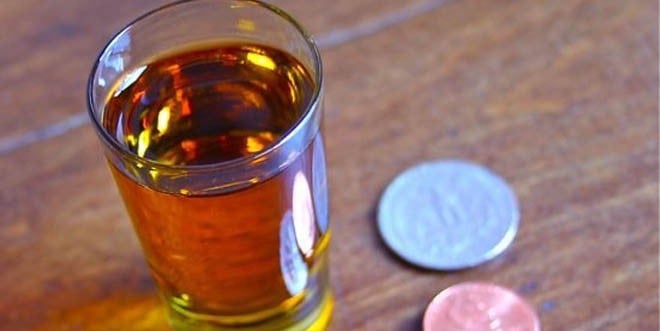
Consumption of cheap substandard liquor has played havoc in Tando Allahyar and Hyderabad districts as the business of preparing it thrives as a local industry across interior Sindh

Bilawal, 21, was the only source of livelihood for his six-member family living in the vicinity of Nasarpur town, some 50 kilometres away from Hyderabad. One day, in the last week of September, after returning from work, he sat with friends and drank some Tharo -- a locally-made liquor -- to forget the day’s hardships.
Later in the night, he is said to have lost the ability to see. Soon after he was brought to the district headquarters hospital in Tando Allahyar in this condition, his identity was reduced to a digit and added to the list of 29 persons who have died of consumption of liquor in just two weeks.
Over the years, toxic liquor-induced deaths have engulfed large swathes of Hyderabad division, particularly affecting people of the lower strata.
Sadly, as the administration was busy shifting the onus by raising ‘jurisdiction’ issues, the death toll increased sharply when the menace spread to adjoining district Hyderabad. Not surprisingly, the issue drew mainstream media’s attention only when two people died in the suburbs of Hyderabad. One wonders about the number of deaths sufficient to trigger media attention. But many believe that a timely coverage of the outbreak of menace could have saved many lives.
Tharo is a popular form of liquor in interior Sindh; it is cheap and easy to prepare. People, mostly women, make this liquor at home and sell. Traditionally, the ingredients include gurr, bark of babul tree, dried orange peels, fertilizers, tranquilising pills and some other herbs. All these ingredients are put into a clay pot and left on slow heat. After undergoing fermentation for 7-10 days, these ingredients yield a product called Tharo in local language. A plastic bag containing 200 ml of this liquor is sold at Rs150. Apart from the toxicity of ingredients, the unhygienic way in which the liquor is made causes innumerable intestinal and renal disorders.
In earlier times, this liquor was prepared and consumed by some farmer Hindu communities such as Kolhi and Menghwars. Hassan Dars -- a leading Sindhi poet -- had penned a verse in which he says "as the dusk falls, all the Kolhies open their pots and sip Tharo in order to break the shackles of slavery tied to their necks".
In the present times, this stuff has turned catastrophic at least for the people of southern Sindh where it has shattered scores of households by killing their young ones.
This business of liquor is a constant source of income for poor families as it helps them meet their ends. "This liquor turned lethal due to the change in its preparation process," says Nasir Nohrio, reporter of a Sindhi news channel at Tando Allahyar. of going through that week long fermentation process, people now buy a chemical which they mix with the ingredients and get the final product in a single day. This has given a boost to their business."
Many believe the actual cause of recent deaths is the impure alcohol smuggled out of sugar mills by the workers and sold to people who are involved in the liquor-making business. Jabran Leghari, a social activist who works for an NGO, offers this insight in detail: "Raw alcohol obtained from sugar mills hastens the otherwise very slow liquor synthesis process. By mixing raw alcohol, it is now readily made and available in desired quantity all the time," he says.
Abbas Ali Shah, Professor of Sociology at Sindh University Jamshoro, attributes the widespread usage of this particular liquor to anarchy prevailing in the society. "Joblessness, poverty and illiteracy cause a sense of frustration in masses that pushes them to find refuge in this cheap and easily available liquor."
Journalist Amar Guriro is of the view that official ban on liquor forces people to use substandard or local liquor. "Restricted and costly availability of standard liquor has resulted in the emergence of alternatives like Tharo and other substandard liquor which are neither scientifically tested nor approved by any responsible authority."
He further tells that large scale consumption and easy availability of this liquor in every village of the province shows that it has now become a local industry. He pointed out a news item in which the police claimed to have seized 7000 litres of deadly chemical from a village near Tandojam on the second day of Eid.
One of the reasons of this huge number of casualties is that people addicted to Tharo are mostly poor people who are scared of investigations once they bring their patient to the hospitals. "People bring such patients when they are already in a critical condition. They prefer to go to the quacks first as they fear legal action or humiliation," says a doctor at Tando Allahyar Civil Hospital on condition of anonymity. "If the patients are brought to the hospital a little earlier, number of causalities could have been reduced." According to him, majority of the bereaved families refused to allow autopsy, fearing legal action against them.
Of late, the police have launched a massive crackdown against the culprits by dismantling makeshift factories of this deadly liquor across the districts in Tando Allahyar and Hyderabad but the death toll is soaring as more people with similar symptoms are reported to have been admitted to the hospitals.
Shadows of deaths loom large in Nasarpur and adjoining towns as people witness their loved ones dying silently. The tragic aspect is that families are reluctant to admit to the deaths as a result of consumption of liquor. "I was helpless both in stopping him from his addiction and telling the truth to the doctor," says Bhemoon Kolhi, whose younger brother died before reaching any hospital.